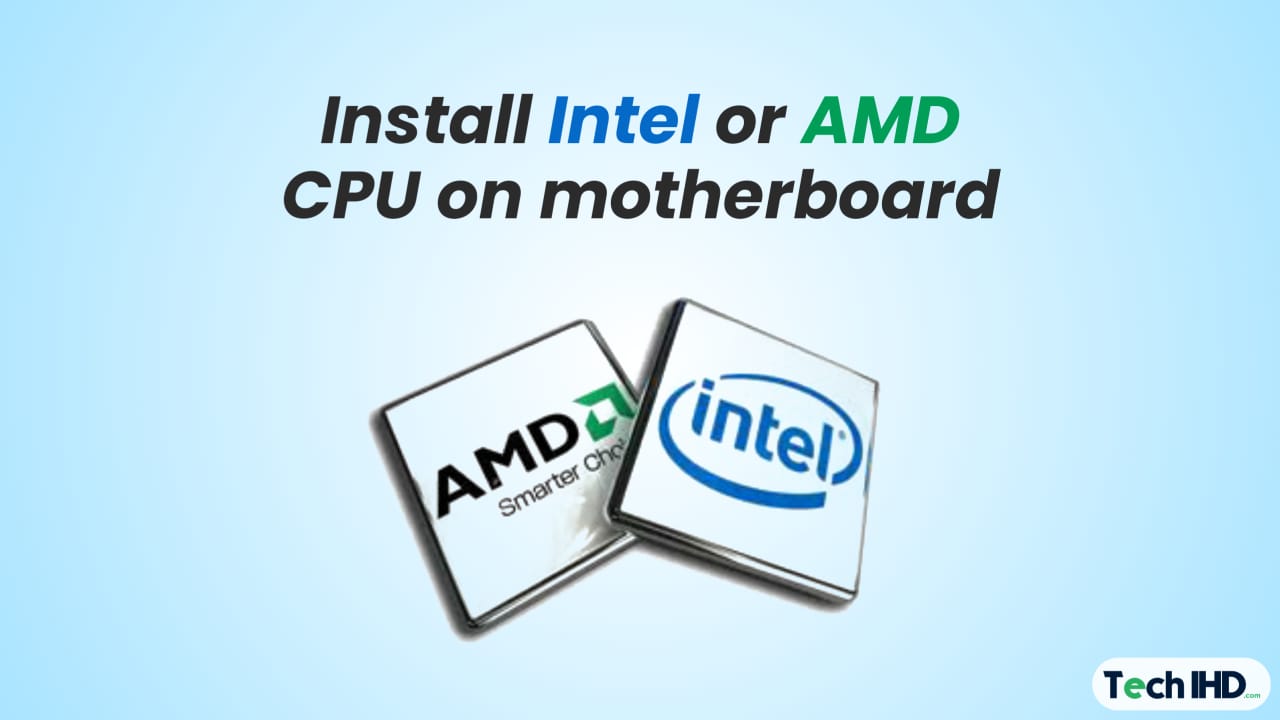Install AMD CPU On Your Motherboard: The beating heart of a PC is its central processing unit, or CPU.is a significant piece in the PC building method. It is liable for passing instructions from the OS and programs for executing tasks and conveying to hardware components what to do. Now Understanding how to install a CPU onto the motherboard in detailed.
Still, there are a couple of tips to understand before and during CPU installation to confirm a properly-installed and protected processor and to bypass damaging parts. CPUs are very fragile, so you must endure your time to ensure you accomplish things correctly. Here We describe detailed step-by-step stages to install the CPU on the motherboard in PC. We also assist you in correctly aligning the CPU in the motherboard socket, especially as a beginner. This process is transparent if you learn what to find out.
So let’s start with the requirements and continue to the installation steps.
Also Read: How to Apply Thermal Paste on Your CPU for Optimal Performance?
Things to Remember Before Installing the Processor
- Be careful While you are Handling the CPU while doing a PC build.
- In this guide, whenever you need to perform an activity that concerns picking up the processor, you uphold it firmly around the corners.
- You must keep it inside the CPU’s transparent plastic box while you know the various varieties of installing it.
- Do not touch the rare side of your CPU (the pins).
- Also, be very careful with the pins attached to your motherboard and the CPU (in AMD, the CPU have pins on its rare side).
Gather All the Necessary Tools

- While this may be an apparent condition, determine to organize your workspace with every required tool to install the CPU.
- You need the motherboard manual (to align the CPU properly), thermal paste (needed after installing the CPU), and the CPU cooler to develop your PC build.
- Also, make sure your workplace is a stagnant-free work environment by levelling yourself.
- It would help if you had An anti-static wrist bracelet to avoid electrostatic injury.
- Check if your CPU’s Compatibility with the Motherboard
- Picking the correct motherboard is also an essential step.
- The motherboard model you use must list your CPU as compatible.

- Another critical aspect is the motherboard’s VRM grade.
- While a low-end motherboard physically supports a high-end processor, it does not certainly mean that its voltage regulator can handle all kinds of loads.
- It would be best to bypass using a low-end motherboard with a high-end CPU.
Also Read: How To Connect a Chromebook to Your TV in 3 Easy Methods
How to Install CPU on the Motherboard
- AMD processor is one of the most favored choices among people in all kinds of budgets, but it is slightly separate from their Intel counterparts.
- For starting the procedure, the pins stay on the chip instead of in the socket.
- You will also require a different frame to install the cooler, better often than not.
- But with those minor hiccups, there is no reason you could not learn how to install an AMD processor in just a few minutes.
1. Locate the CPU Socket

- First, go ahead and locate the CPU socket on PC’s motherboard.
- It would help if you are looking for a large square socket near the middle of the motherboard (that has a little metal lever alongside it)
- This is where your CPU will reside for the next few years.
- Intel and AMD sockets look different but are in the exact location.
2. Open the CPU Socket
- To open up the CPU socket on the motherboard, you must first lift the retention arm (the small metal lever on the side of the socket).
- Unlock the retention component by pulling its release to the right (away from the socket) so it is free to be raised.
- Lift the component all the way, and then open the socket cover. Only Intel CPU sockets cover – AMD sockets do not.

- Unlocking an Intel CPU socket: Remove the retention arm to the right and raise it.
- Now you open the socket cover.
- For installing AMD CPUs (AM4 sockets), you have a small retention arm to lift to the side and up, but no socket cover is present to open.
- Rather than, when you lift the retention component to a 90-degree angle, it automatically opens the middle part of the socket to reveal the middle.
- AMD sockets do not have covers like intel sockets.
- Intel CPUs contain actual contact pins on the motherboard, considering AMD CPUs have contact pins on the CPU itself.
Also Read: How Do You Install Graphics Card (GPU) In Your PC
3. Match Arrow and Lower CPU Into Socket
- First, look near the CPU socket and find a small icon at the bottom left corner.
- This arrow indicates in which way to install your CPU.

- Intel on the left and AMD on the suitable sockets have one mark on the bottom left.
- There is only one correct position to install Intel or AMD CPU into the socket is placing it on the CPU that matches the mark on the bottom left of the socket.
- When the CPU is completely lined up with the socket, you can gently allow it to fall into place naturally.
- Do NOT push or force the CPU in – if you lower it correctly, it will smoothly place into the spot.

Also Read: How To Delete Apps on a Chromebook?
4. Lock the CPU Socket
- Now you must lock the CPU socket.
- For Intel CPU establishes, pull the socket cover, lower the retention component(the small lever) and clip it into the hook.
- The CPU socket cover then automatically comes out (store it in a secure box in case you require it in future).
- For AMD CPU installs, lock down the retention component into location.
- Now your CPU installation is done and dusted!
- It is very straightforward and tough to screw up if you take time and understand each stage before doing it.
- Now brains of your machine are in place, keep it for some time to cool and quiet by providing the heatsink and fan (CPU cooler).

5. Install the CPU cooler
- AMD processors will only work for a longer time with a cooler.
- You will obtain them either in the box with AMD CPUs or get them as an aftermarket option, whether liquid or air.
- In any case, the installation will be apparent to your selected cooler, so take a guide from the manual for the necessary steps.
- You are especially likely to need entry to the rear of your motherboard, so ensure possibilities by pulling the back panel from your PC chassis.
- It’s time to install the cooler itself.
- Then bring the cooler’s fan heading and plug it into the individual slot on your motherboard.
You may also like :-
- Top 10 Best Free Video Editing Apps For Android
- Indian Govt Banned 59 Chinese Apps Including TikTok Due To Border Tensions
- No Root Firewall App: Top 11 Best Apps For Security {2025}
- How To Apply Lifetime FREE Flipkart Axis Bank Credit Card
- Top 50 Telegram Channels For Online Shopping Deals & Loot [2025]
Conclusion
If the above steps went satisfactorily, your CPU should successfully install. Yet, If you still have the remains of the PC to make, observe our guide to achieve everything else in position.



![How to Use ChatGPT Canva Plugin to Up Your Social Media Game [2025] How to Use ChatGPT Canva Plugin](https://techihd.com/wp-content/uploads/2025/01/Use-ChatGPT-Canva-Plugin.jpg)
![How to Use One WhatsApp Account on Two Phones in [2025] One Whatsapp In Two Phone](https://techihd.com/wp-content/uploads/2025/02/two-whatsapp-in-one-phone-218x150.webp)


![How to Upgrade and Install a Graphics Card in Your PC [2025] How Do You Install Graphics Card (GPU) In Your PC](https://techihd.com/wp-content/uploads/2023/03/WhatsApp-Image-2023-03-03-at-14.49.35-2.jpg)
